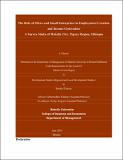| dc.description.abstract | Unemployment and low income are one of the present situations in urban cities of Ethiopia. The government of Ethiopia has formulated a policy to mitigate the overwhelmed problem by fostering micro and small enterprises. In this thesis an attempt is made to assess whether MSEs create employment opportunities and income increase in Mekelle city, Tigray. During the study, primary data were collected from 123 owners and 106 employees of MSEs. In addition secondary data were collected from Tigray regional state bureau of Trade, Industry and Transport. Questionnaire and interview were used as data collection instruments. For data analysis, descriptive statistical tools such as tables, frequency distribution, percentage and focus group discussions were used to describe the responses on the role of MSEs. The study revealed that there is growth rate of MSEs in Mekelle city and the five year trend of MSEs, shows 19.8 percent annual average growth rate of MSEs. Regarding employment creation, MSEs owned individually and cooperatively created to around 5.7 and 8.4 average number employees respectively in five years. There is difference among sectors in terms of number of employees per MSEs, the manufacturing and construction sector have 7.52 and 8.3 average number of employees per MSEs respectively in five years. Service sector also have 5.4 average numbers of employees per MSEs. There are different types of employment among which full time self business and full time recruited are the more dominant type of employment than other types of employment in MSE owners and employees respectively. MSEs have great contribution to income. Most of the MSE owners (44.6%) get average annual income from 30,001-60,000 birr while majority of the employees of MSEs (42.4%) get average annual income of 7,402-8,402 birr individually. Most of the MSEs also face constraints during operation and start up time and the major constraints are in their order is financial shortage and unable to get access and affordable house rent. To conclude MSEs have great contribution in reducing unemployment and in providing income to those owners and employees of MSEs. Based on the major findings a number of policy recommendations are drawn. Among these access credit has vital role in growing MSEs. Giving work place and business development service would help MSEs to produce and sell products easily. | en_GB |


